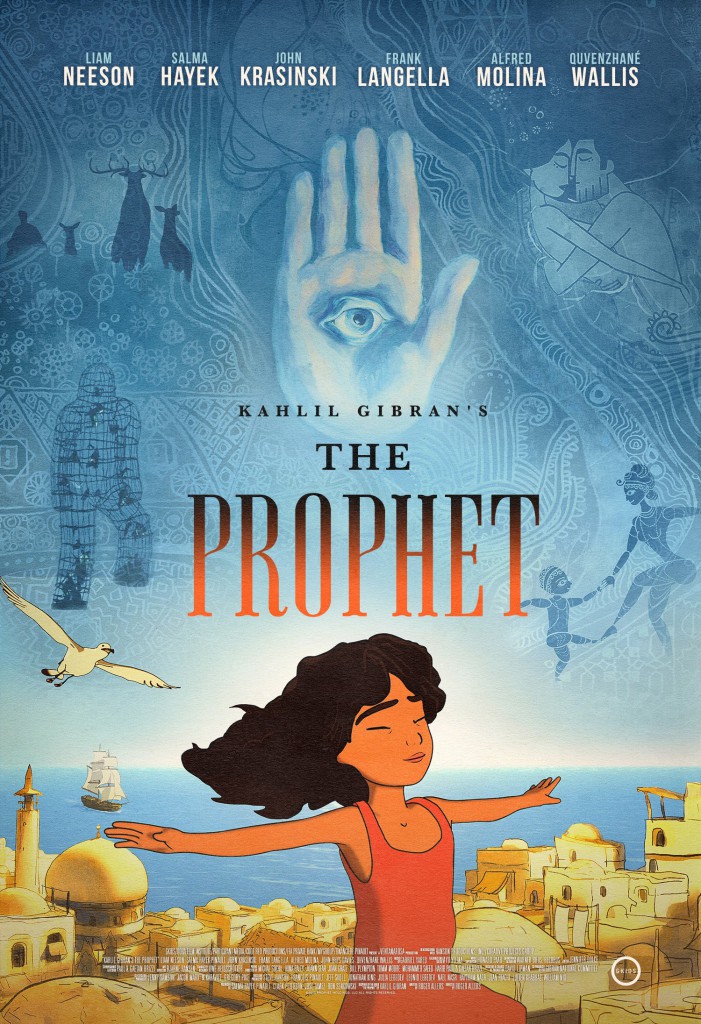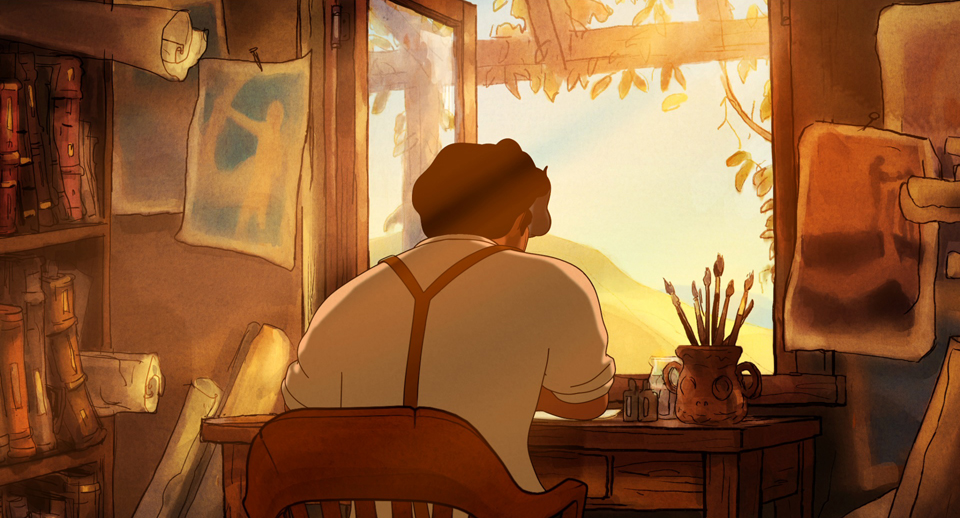Tim's Toons: Kahlil Gibran's The Prophet
 Friday, September 18, 2015 at 10:00PM
Friday, September 18, 2015 at 10:00PM  Tim here. To the right kind of viewer (e.g. the kind writing this review), Kahlil Gibran's The Prophet is THE animated event of 2015. Which does not, unfortunately, turn out to mean that it is THE best animated film of 2015, or even in the running for that title. But let us not accentuate the negative; it's still a special and enormously idiosyncratic little movie, and its failures are honorable.
Tim here. To the right kind of viewer (e.g. the kind writing this review), Kahlil Gibran's The Prophet is THE animated event of 2015. Which does not, unfortunately, turn out to mean that it is THE best animated film of 2015, or even in the running for that title. But let us not accentuate the negative; it's still a special and enormously idiosyncratic little movie, and its failures are honorable.
The film is a long-simmering passion project for producer Salma Hayek, one of the many ardent fans to accrue to Gibran's 1923 English-language collection of essays (Gibran was Lebanese, as was Hayek's grandfather). When, exactly, she decided that the adaptation needed to be done in animation is anyone's guess, but it was exactly the right choice: the book consists primarily of a series of spiritual lessons in the form of prose poetry, with the ghost of a narrative connecting them. The film by necessity fleshes out that narrative considerably and literalizes it, but the meat of the film is still those essays: eight out of Gibran's original 26, each handed off to a different luminary in the world of international animation.

Those eight sequences are easily the best reason to see The Prophet. Hayek collected a one-of-a-kind murderer's row of talent, not all of them household names, but each of them responsible for some truly important work. Bill Plympton, Tomm Moore (of the Oscar-nominated Song of the Sea), Nina Paley (who directed the miraculous Sita Sings the Blues, damned into obscurity because of music rights), Joan Gratz (whose Oscar-winning clay painting exercise Mona Lisa Descending a Staircase is amongst the most thoroughly original pieces of animation you will ever see), and the Brizzi brothers, Gaëtan & Paul, all throw in a piece in their signature style.

Not everything is equally successful: Moore's ultra-Celtic aesthetic mashes up weirdly with The Prophet's Mediterranean setting, and Paley's sequence is a peculiar noodle with that gets hung up on just a couple of ideas that it rides into the ground. Still, taken as a whole, these sequences are captivating, with Gratz's fluid, morphing paintings and Michał Socha's dramatic, terrifyingly raw drawings of birds leading the pack as some of the best animation likely to show up anywhere you look in 2015. Having Liam Neeson's authoritative but soothing voice on hand to recite the poems surely doesn't hurt, either.
As exciting as these sequences are individually, and as interesting to see such a disparate variety of artists tackle similar material, the framework that The Prophet forces them all into is simply not that good. Worse than not that good, in fact; it's a specific kind of jokey, lightweight not-that-good which appears to be chasing a completely different and incompatible audience. The main narrative was directed by Roger Allers, who will never achieve enough greatness to be primarily known as anything other than the director of The Lion King. Sure enough, there's a distinctly "1990s Disney" feel to much of the story that plays out. On the pointedly placeless island Orphalese, a poor single mother, Kamila (Hayek) is running out of emotional resources to deal with her unspeaking daughter Almitra (Quvenzhané Wallis, when she ultimately speaks). The girl constantly gets into the exact kind of trouble that plucky Disney heroes land in - she is, in fact, almost exactly what happens when you cross Aladdin and Mulan. And she does it while having a comic animal sidekick (who, thankfully, is also unspeaking).

The generic kids' movie tosh of Almitra's story is tough going, and while the game cast (including John Rhys Davies, Alfred Molina, and John Krasinski, who wins the greatly-contested title of most wildly out-of-place in this Turkish-ish setting) puts all the charm and warmth into it they can, that doesn't change the jokes are musty and hokey, and the scenario deeply trite. It's one bromidic observation after another pitched squarely at an undemanding family audience that's hardly likely to stumble into this boutique release. And even if they did, the politically tense, philosophically heavy matter of Mustafa (Neeson), the controversial poet under house arrest to whom Kamila serves as housekeeper would hardly be the stuff of a nice movie to take the kids to.
It's the simplest, most fatal problem in the world: The Prophet wants to occupy two totally incompatible moods, and so it shifts from bland kids' cartoon to visually audacious spiritual essay for grown-up animation buffs without having any sense of how to make those things work together. The aggressive effort put into making the computer animated frame story look like 1990s cel animation adds another layer of confusion - is this tapping into nostalgia, or trying to appeal to the crisp lines and smooth movement of modern TV animation, and in either case, did it have to look so uncanny and ugly?
Basically, The Prophet is a lot of individually reasonable impulses that have been wedged insensibly into one single movie. I can't not recommend it: the best it has to offer is absolutely essential animation, and Paley's is the only segment that's even a little bit weak. But I can't recommend it, either: it's dimwitted comic boilerplate mounted on a lattice of hollow dialogue and clichéd characters. In the old days, they'd call this one "worth a rental"; certainly, the ability to fast-forward to the good parts could only help.

Grade: C (the frame); A- (the rest)



Reader Comments (1)
First off, brilliant summary. I loved the movie even if the weak frame left me wishing I'd be able to love it more.
Second, maybe it's because of the VMA's HMWYBS, but Moore's segment couldn't help make me think of the music video to Thinking About You.